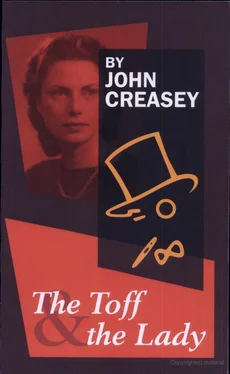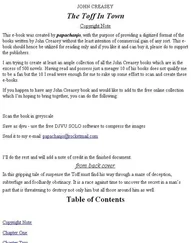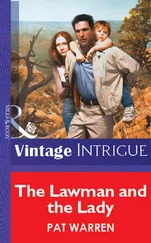John Creasey - The Toff and The Lady
Здесь есть возможность читать онлайн «John Creasey - The Toff and The Lady» весь текст электронной книги совершенно бесплатно (целиком полную версию без сокращений). В некоторых случаях можно слушать аудио, скачать через торрент в формате fb2 и присутствует краткое содержание. Жанр: Старинная литература, на русском языке. Описание произведения, (предисловие) а так же отзывы посетителей доступны на портале библиотеки ЛибКат.
- Название:The Toff and The Lady
- Автор:
- Жанр:
- Год:неизвестен
- ISBN:нет данных
- Рейтинг книги:5 / 5. Голосов: 1
-
Избранное:Добавить в избранное
- Отзывы:
-
Ваша оценка:
- 100
- 1
- 2
- 3
- 4
- 5
The Toff and The Lady: краткое содержание, описание и аннотация
Предлагаем к чтению аннотацию, описание, краткое содержание или предисловие (зависит от того, что написал сам автор книги «The Toff and The Lady»). Если вы не нашли необходимую информацию о книге — напишите в комментариях, мы постараемся отыскать её.
The Toff and The Lady — читать онлайн бесплатно полную книгу (весь текст) целиком
Ниже представлен текст книги, разбитый по страницам. Система сохранения места последней прочитанной страницы, позволяет с удобством читать онлайн бесплатно книгу «The Toff and The Lady», без необходимости каждый раз заново искать на чём Вы остановились. Поставьте закладку, и сможете в любой момент перейти на страницу, на которой закончили чтение.
Интервал:
Закладка:
tenant has gone away for a week.”
“There was someone inside,” stated Grice.
“About whom we shall tell you in due course,” said Rollison, who felt on top of the world. “I think the Superintendent wants a few words with you, Miss Armitage.”
She still looked puzzled. “Of course,” she said, and went back to her own rooms, leaving both front doors ajar.
Grice had changed into a brown lounge suit and looked much more comfortable. There was a note of acerbity in his voice.
“I thought I’d find you here when I heard you’d been to the nursing home,” he said.
“Prophecies all coming true,” said Rollison, “and yet you always say you don’t believe in hunches.” He unbuttoned his pocket as he spoke.
Grice said: “What have you said to the girl?”
“You didn’t give me time to say much,” said Rollison. “Another ten minutes, and I would have got the whole story out of her. Here’s a present for you. I don’t mean the florin,” he added as he held the medicine glass out. There was still a little liquid at the bottom when he tilted it. “Go on, it won’t bite—didn’t the matron tell you I’d taken it away?”
“Yes,” said Grice. He took the glass and put it on the mantelpiece. “Why did you take it?”
“Curious disquiet at nursing home,” said Rollison. “It may have been genuine alarm at the collapse of “the lady”, or it might have been because they have failed to carry out police and doctors’ instructions, but it might also be because they harbour deep and guilty secrets. I didn’t intend to take any chances with that glass, although it probably contains nothing but Neuro-Phosphates .” The bantering note faded from his voice as he added: “How is the lady?”
“It will be touch and go,” Grice answered. “They think they’ll pull her round.”
“No murder yet,” said Rollison. “Here nor there.”
“You’re in an infuriating mood,” said Grice. “Here or there what?”
“No murder,” said Rollison. “Man with gun dressed as a painter was almost certainly after our demure little lady here. She has a very pretty face, not at all a bad figure, and something of the air of an ingenue which I think is natural and unassumed.”
You always did fall for a pretty face,” said Grice.
“That’s uncalled for, unfair, unjust and quite true,” declared Rollison. “See what you can find out from her. I don’t think she will keep much back. I do not think that she left the mystery lady’s room on a pretext, but I shouldn’t read too much in that. By the way, what doctors attend “the lady”?”
“Renfrew, of Wimpole Street, and Cray.”
“Renfrew as Mrs. Barrington-Ley’s society nominee, I suppose,” said Rollison. “Cray put up by the Yard.”
“Why do you ask?”
“Curiosity,” said Rollison.
“You’re unbearable,” said Grice. “Are you coming in with me to talk to this girl?”
“No, I must be off. I promised to call on Hilda to-night.”
“Mrs. Barrington-Ley?”
“Yes. Good hunting!” Rollison smiled and led the way out of the room.
As he reached the landing one of Grice’s men appeared on the landing below. The man came up when Rollison beckoned him, and reported that the pseudo-painter had managed to get away, but that Sergeant Miller was trying to find out where he had gone.
Grice was about to tap at Phyllis Armitage’s door and Rollison was half-way down the stairs, when he stopped, turned and called:
“Oh, William?”
“Yes?” said Grice, also turning.
“How was the wedding?”
Grice glared. Rollison, smiling as if he thought he had cracked a brilliant joke, continued down the stairs and into the street. There was a chance that Jolly had succeeded in tracing Marcus Shayle’s home, and therefore a chance of seeing the man before the police reached him. Hilda could wait until he had heard from Jolly. He called his taxi and, in a voice loud enough for Grice to hear, gave him the address of Barrington House, changing it only when they were in Bayswater Road.
Beneath his good mood there was an underlying note of uneasiness. Even if the case resolved itself fairly well, and Marcus Shayle had poisoned the lady of lost memory, much would remain unsolved, and there would be danger to both the unknown woman and to Phyllis Armitage. It was disquieting to think that a man had been waiting in the neighbouring flatlet, doubtless with the intention of murdering Phyllis. The man had probably postponed action because he knew that Phyllis had a visitor, but then been forced into the open. From these conclusions it was reasonable to suppose that Marcus Shayle and others were most anxious that Phyllis should not disclose the story of her actions that day.
Jolly had not yet returned to Gresham Terrace. It was then nearly half-past seven, and Rollison telephoned Barrington House, asking for Hilda. A man with a stilted voice regretted that Madam was out. So, it proved, were David Barrington-Ley and Gwendoline. He had been wrong to assume that Hilda would be sitting at home waiting for him.
He took out the slip on which he had written down the name and address of the firm of accountants which Shayle had visited. Messrs. Pomeroy, Ward & Pomeroy, of 88g The Strand, were in the telephone directory, and he made a note of their number. Then he called the house of Sir Lancelot Anstey. He was remotely related to Anstey by marriage; Anstey managed all his legal affairs and, for a man of nearly seventy, viewed his activities with a remarkably benevolent eye.
When Anstey came to the telephone, he said:
“More trouble, Rolly?”
“Certainly not,” said Rollison. “A trifling matter in which the advice of the most distinguished member of the legal profession would be welcome.”
Anstey chuckled.
“You certainly want me to do what I shouldn’t!”
“If that were so I should come and see you with a bottle of fine old brandy,” said Rollison. “The question before the oracle is—if you were not in existence, would anyone recommend me to take my business to Pomeroy, Ward & Pomeroy, of the Strand?”
“No,” said Anstey, promptly. “Not unless they had a good reason to dislike you.”
“It’s as bad as that, is it?”
“Now don’t misunderstand me, Rolly,” said the older man. “I know nothing against the firm, except that it sometimes handles cases which are rather unsavoury. It hasn’t a large connection and it isn’t very well-established. There is a companion firm of accountants—virtually the same people of course.”
“Is it a new firm?”
“It was started about ten years ago,” said Anstey. “It specializes in raising loans and mortgages and arranges advances on testamentary expectations.”
“Ah,” said Rollison. “Moneylenders.”
“What makes you inquire?” said Anstey.
“You’ve probably heard of the case of the lady in high society who lost her memory,” said Rollison.
“Do Pomeroys claim to know her?”
“They haven’t done, yet,” said Rollison. “Many thanks for the information.”
“I suppose it’s no use trying to make you explain,” said Anstey.
Although he had been very forthcoming for a lawyer, Anstey could probably have said much more. Rollison pondered over that and the record of the dual firms of Messrs. Pomeroy, Ward & Pomeroy, until the telephone awoke him from his reverie.
“Hallo, Jolly!” he said a moment later. “News?”
“Of a kind, sir,” said Jolly. “I am speaking from a telephone kiosk in the Strand. After making several brief calls at shops, and two telephone calls from public call-boxes, the young man returned to the office and is still there. I am now watching the entrance, sir, and it occurred to me that you would probably like to know at once what was happening.”
Читать дальшеИнтервал:
Закладка:
Похожие книги на «The Toff and The Lady»
Представляем Вашему вниманию похожие книги на «The Toff and The Lady» списком для выбора. Мы отобрали схожую по названию и смыслу литературу в надежде предоставить читателям больше вариантов отыскать новые, интересные, ещё непрочитанные произведения.
Обсуждение, отзывы о книге «The Toff and The Lady» и просто собственные мнения читателей. Оставьте ваши комментарии, напишите, что Вы думаете о произведении, его смысле или главных героях. Укажите что конкретно понравилось, а что нет, и почему Вы так считаете.












